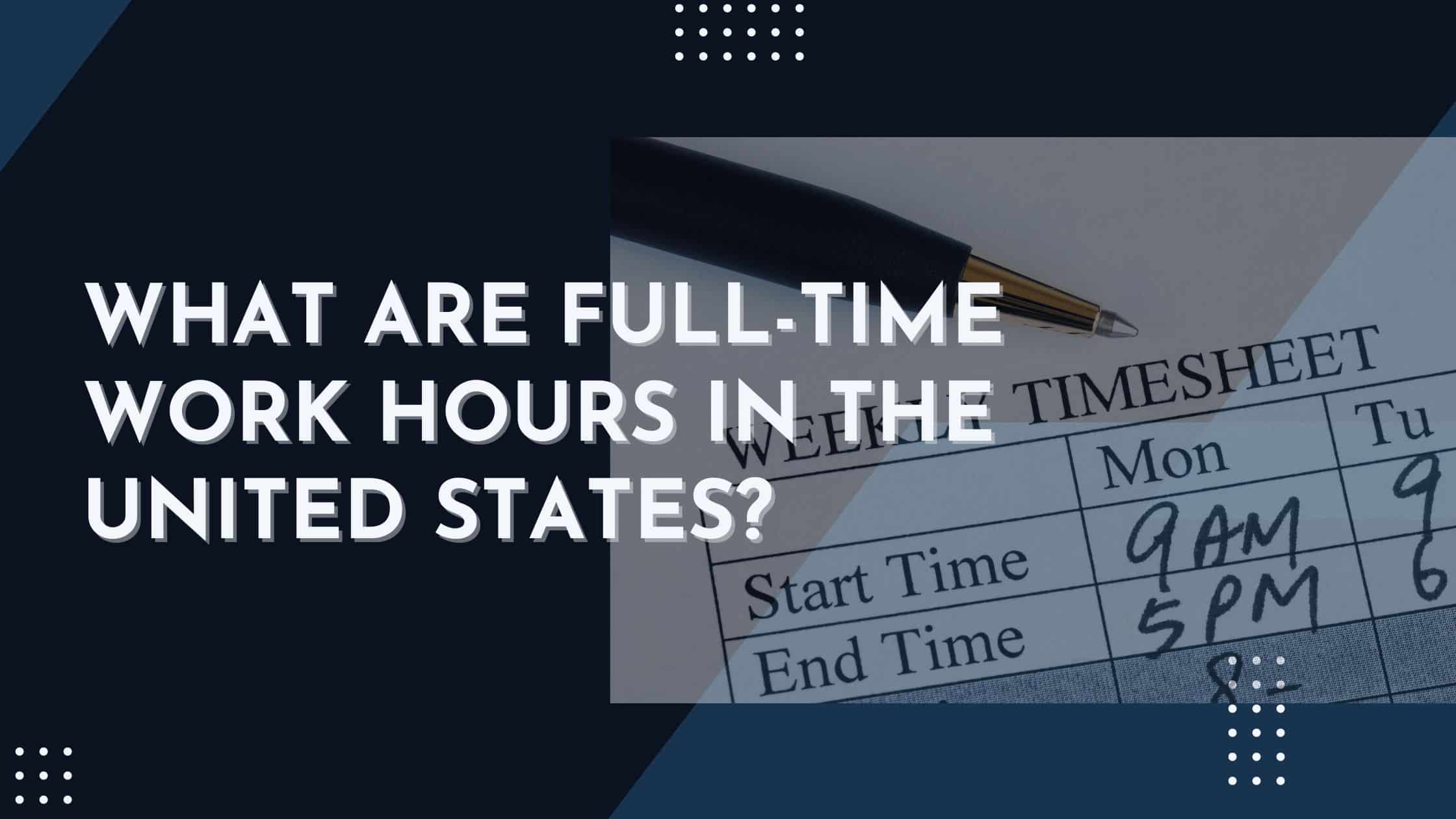Table of Contents
ToggleFull-time work hours in the United States are not defined by law. There is no standard definition of full-time work hours because the United States Department of Labor assigns the definition to employers who, in turn, determine their company’s policies of what full-time work is.
Furthermore, the Department of Labor does not provide a distinction between full time and part-time work hours.
Although federal law does not define what full-time work is, some laws do offer guidelines on the benefits, minimum wage, and overtime pay for hours worked by employees.

Common Misconceptions About Full-Time Work
Because there is no law stating the standards of what full-time work is, there are common misconceptions people have regarding this employment status. It is important to discuss these myths to debunk any misconceptions that employees may have when entering the workforce:
Myth 1: Full-time work is 30 to 35 hours per week
Most people believe that as long as you work from Monday to Friday between 9 to 5, or at least 30 hours per week, that is considered to be full-time work.
Though this has been known as the standard workweek, it is not regulated by federal law. As previously noted, only an employer determines what full-time work is. It can be 30 hours a week or 40 hours, or even below this number.
Myth 2: Full-time work always comes with benefits
Though most companies do offer benefits to their full-time employees, they are not obligated by law to do so.
An employer is not obliged to provide sick leave, vacation leave, or health coverage unless they are identified as Applicable Large Employers (which will be discussed in the next section).

Laws That Offer Guidelines for Determining Full-Time Work
Full-time work in the United States typically comes with employee benefits but since it’s not required by law, several guidelines do require companies to provide benefits to their employees. The three laws are as follows:
- The Fair Labor Standards Act (FLSA)
- Family and Medical Leave Act (FMLA)
- Affordable Care Act
The Fair Labor Standards Act
The Fair Labor Standards Act (FLSA) does not define what full-time or part-time work hours are but it does make provisions for the determination of work hours to employers. The Act has a number of stipulations that employers must adhere to.

These requirements include paying employees the federal minimum wage of $7.25 for every hour of service up to 40 hours per week.
Once the employee exceeds this number of hours, the employer must pay the employee one and a half times their current hourly wage for every excess hour worked.
The FLSA is largely credited for creating the notion that full-time work hours in the United States is a maximum of 40 hours per week. This is due to the Act’s consideration of hours worked more than 40 hours to be considered as overtime work.
The Family and Medical Leave Act
The Family and Medical Leave Act is a federal law that requires Applicable Large Employers (ALE) to provide employees unpaid leave of up to 12 weeks for medical reasons, the birth of a child or adoption, or if a close family member is in serious health condition.

An ALE is an employer that has 50 or more full-time employees. To qualify for this benefit, employees must have worked for the company for at least 1,250 hours for 12 months before the date of the leave.
These hours of service have an equivalent of at least 24 hours of work rendered in a week for 12 months.
Affordable Care Act
The Affordable Care Act, also known as Obamacare, includes a law that requires all ALE to provide minimum health coverage for all of their full-time employees.
Failure to do so will incur a penalty or fine from the IRS (Internal Revenue Service). The obligation is part of the employer’s shared responsibility provisions under this Act.

To identify full-time employees in an ALE entity, the IRS defines these employees as those that render an average of at least 30 hours of work per week or 130 hours per month.
Smaller companies that have less than 50 full-time employees are not covered under this Act, and are, therefore, not obligated to provide minimum healthcare coverage to their employees.
Standard Full-Time Work Hours in the United States
While there is no federal law indicating what a standard full-time work week in the United States is, common standard working hours are being practiced by most employers in the country. These are:
- Full working hours are considered to be from 9 to 5, or a total of 8 hours per day with one 30-minute lunch break.
- The full working days of the week are from Monday to Friday.
- Common benefits for full-time workers include vacation leave, sick leave, health insurance, retirement benefits, and others.

Though these are typically practiced, an employer is not obligated by law to follow these standards. Some states do define full-time work in specific hours, such as 32 hours per week of work in Texas and 40 hours of work per week in Florida and California.
Is There a Maximum Limit an Employee Can Work per Week?
The Fair Labor Standards Act states employees can’t be legally required to work over 48 hours per week. However, working such extended hours is acceptable if the employee consents and his or her overtime pay is paid according to the law.

Get Smarter on US News, History, and the Constitution
Join the thousands of fellow patriots who rely on our 5-minute newsletter to stay informed on the key events and trends that shaped our nation's past and continue to shape its present.
Students or employees below the age of 18 are not allowed to work for more than 8 hours per day or more than 40 hours per week.

Because there is no federal law defining what full-time work hours are in the United States, job applicants need to ask about the employment status of the position they are applying for.
Some employers take advantage of the system by declaring some employees to work under 130 hours per week to avoid paying for health benefits.
Always ensure that the company you’re planning to work for has distinct definitions of what a full time and a part time employee is to avoid problems.
For companies, create clear definitions of what a full time employee is to avoid complaints and grievances in the future.











